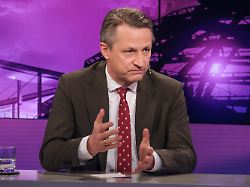Traffic light dispute settled?
Blome: “Expect coalition of distrust”
By Marko Schlichting
03/29/2023, 05:40 am
For weeks the traffic light was in a clinch, especially the FDP and the Greens could not find a common denominator. But it seems to have been found now: after 30 hours the coalition committee presents the government with its plans. They are also a topic on the ARD and ZDF talk shows.
They sat together for thirty hours, the coalition partners from the SPD, FDP and Greens. The result was sixteen pages containing nothing less than a new coalition agreement for the next few years. If there were a winner in the negotiations, it would be the FDP. In addition to the energy neutrality in heating conversions, which the building energy law provides for, the accelerated expansion of 144 motorway projects is also due to them. She has also been campaigning for years to reduce bureaucracy, which is now to be accelerated.
But the Greens have also achieved a lot. New stretches of motorway are to be equipped with solar panels, and rail expansion is to be promoted, even if its financing has not really been clarified yet. Although the truck toll is to be raised next year and 80 percent of this will flow into the rail project, that is far from enough. Nature conservation should also be promoted. The Greens had to bury other projects for this: A speed limit, for example, seems to be off the table for good, at least not a word is mentioned in the document.
And the SPD? Its chairman Lars Klingbeil is allowed to open the press conference on Tuesday evening, in which the results of the coalition committee were presented and then give interviews on ARD and ZDF. Also something. However, the coalition partners have achieved one thing, and they are definitely ahead of their predecessors in recent years: During the talks, not a word got out. A promise that they made a year and a half ago and that they have kept perfectly.
In any case, the dispute seems to have been settled for the time being. However, RTL and ntv political chief Nikolaus Blome believes that the clashes of recent weeks have left their mark. He fears that Germany will experience a “coalition of distrust” in the next few years. At Maischberger on ARD, the journalist does not want to talk about winners and losers on Tuesday evening. But he praises: “At least in one place, reason has prevailed: that is the achievement of climate targets for carbon dioxide.” Blome ironically mentions that he not only wants solar panels on the freeways, but also a better cell phone network on the rails. However, digitization does not seem to have been an issue in the government’s mammoth negotiations. Finally, Blome criticizes that nothing is regulated about the budget plans and too little about the issue of heating conversions, which affects many citizens.
Climate protection common interest
At the same time, Economics Minister Robert Habeck talks about exactly this with Markus Lanz on ZDF. “We agree that we do not want new oil and gas heating systems to be installed from next year,” says the Green politician. However, the discussion is not over yet. They want the Bundestag to be able to pass the building energy law in question by the summer holidays.
According to the will of the coalition, the law should continue to apply on January 1, 2024. Then – apart from a few exceptions – only heaters that are operated with at least 65 percent renewable energies may be installed. Gas and oil heating systems already have to be replaced after thirty years at the latest. There should be exceptions here in the future, says Habeck: “We will exempt old people who cannot or do not want to make the investment from this obligation.”
What is also new is that financial support for heat pumps, which is currently up to 40 percent, will no longer be available to everyone from 2024. Habeck: “In the future we will look at the income situation and ensure social balance so that people with lower and middle incomes are not overwhelmed and, in my opinion, do not have to pay more.”
However, there is one problem: At the moment it is almost impossible to get a heat pump in Germany, not to mention heating engineers with the appropriate specialist knowledge. Plumbers are currently being retrained, says Habeck.
However, he makes it clear that heat pumps do not necessarily have to be installed. Heating with green hydrogen should also be possible in the future. Cities and municipalities could also set up district or local heating networks. The federal government wants to accelerate the network expansion. In such a case, homeowners whose oil or gas heating system gives up the ghost too early can also install a used boiler for a transitional period, Habeck promises.
“Highway expansion pragmatic solution”
Habeck admits that the Greens were not really satisfied with the decision to expand the motorway. “It’s a pragmatic solution,” he says at Lanz. “We’re not proud of it, but that’s part of the essence of compromise.”
So everything ok? CSU regional group chief Alexander Dobrindt does not believe that. “We have a traffic light for disputes, and now the dispute is being declared culture,” says the politician at Maischberger in the first. According to Dobrindt, the result was too vague for a 30-hour meeting. Unlike CDU leader Friedrich Merz, however, he would not speak of a government crisis.
